|

Eastern newt, Notophthalmus viridescens. Harlan Co., KY.
(*photo credit)
January 1, 2019 Starting the Year Anew
Welcome back to veteran viewers! Let's make this a year of deeper reflection. Pray that in my 86th years I still have some energy to assemble these mini-essays for the good of all who are committed to hastening the day of the Lord's coming. Time is short and ever shortening, so let's make the best with what we've got.
The word "ecology" comes from ecos or home. We are well aware that our Earth is being damaged by human misuse and misplaced tolerance for the waste and emissions now being generated. The spiritual aspects of our journey in faith are introduced in a liturgical homily on Sundays and feastdays, but there's more. Our immediate homes must be enlivened with gardening and herb growing, culinary arts, home safety and improvement, energy conservation, yard management, wilderness management, personal wellness programs, communication arts as related to healing Earth, resource and personal planning, eco-spiritual subjects, models and public interest groups to imitate, and peace and broader-based social justice issues. None are totally complete, for our respective lives are truly works-in-progress -- as are the materials about which we write and the research that we attempt.
Through these "Daily Reflections," YouTube videos, Amazon Kindle and Facebook weekly inserts, we have learned to appreciate the value of a worldwide Internet, which has the potential to touch folks in many distant lands with relative ease and low cost; websites require no studios, offices or printing shops, and the turnover from assembling to delivering information is rapid. Provided the Internet is not saddled with governmental restrictions or privileged privatization, this medium offers a democratic means where the lower-income folks voice their views. In essence, the Internet becomes a means of liberation quite similar to our free highway system (although a number of these are being privatized). The Internet is a technological opportunity much like ancient Rome's road network at the time of the rise and rapid spread of early Christianity. Using this medium well requires vigilance and constant care, lest it be misused or coopted.
God willing, during 2019 we intend to offer the wide range of services that has been traditional for the last fifteen years. These do not come easily, for presentation requires begging for funds it takes to create, process, edit and manage content on the Internet and for videos and written matter produced. You the reader may encourage, object or hope to see some topics introduced, expanded, modified or suppressed. We have a practice of addressing these concerns to the degree possible. All our staff has other duties that take up half of their time; we are confident you will honor these limitations -- and help us become more effective.
Prayer: Lord, allow us to see beyond the present moment and assist others in better ways to reflect on the goodness of Your creation, and in so doing to heal our wounded Earth. Urgency drives us forward.

Tahquamenon Falls, Michigan
(*photo credit)
January 2, 2019 Learning to Plan Ahead
Some of us are compulsive planners. Maybe it is the demand to establish order in our lives in a troubled world and an ever shortening time to achieve our hopes and dreams. But planning may be demanded for other reasons. Some of us were slow learners, and thus to succeed in achieving pressing assignments and overcoming learning hurdles we had to plan carefully so we could have sufficient time to complete impending deadlines. I know people who learn rapidly and never consider planning time -- and that could result to disrespect for time -- and they were handicapped.
Why plan ahead when we don't know what the future will bring? If we knew the future perfectly the drama of life would become an uninteresting lack of excitement, a grand yawn. God gives us the time that invites us to make a difference, even though we cannot foresee clearly the specific result. Our trust is that we will respond to the grace of being generous with that limited and relatively short span. The planning assists us to take our responsibility seriously. The best way we compensate for past wasted time is to use efficiently and wisely what remains along with a deepening resolve to do the best we can.
Can't we overplan for particular occasions? Certainly, but fewer overplan than underplan. The Lord speaks about those who underplan, and the army is lost in battle or the house built on sand is destroyed. Somewhere between the rare overplanning and the far more frequent underplanning is the happy medium to which we ought to strive. That is why "tithing" time approaches godliness. If we give time to planning, we show gratitude for the gift we have, for God mercifully gives us this day to live and breathe.
What do I plan for? Just about everything: the amount of time to allot to various projects, the amount of money apportioned to specific activities, which books to read or periodicals to order, how to travel with safety and efficiency, free time and vacation, what subjects to focus on, how I will carry on my civic duties in this critical time, awareness of sickness and funerals being part of the upcoming schedule even when not knowing when and where, and how to plant and care for this year's garden and herb plot. Continual planning readjustments are necessary.
When and how do we conduct our planning process? Divide planning into that which is social (working together in cooperation with others) and that which is related to personal life. Maybe the best personal planning is just before falling asleep or just after waking up, or during physical exercise or travel. Some use paper and pen and others a computer or electronic gadget to help plan. You may wish to talk over issues with others. Plan the unexpected. Don't forget that planning gives us an added sense of purpose, a quality that others can discover and add to their own lives.
Prayer: Lord, teach us to respect the time gift You give us.
Encourage us to plan and yet see the limitations involved.

Pinesap, Monotropa hypopitys, parasitic plant in flower.
(*photo credit)
January 3, 2019 Winter Riders
Cars passed them by on the Daniel Boone,
avoiding risks perhaps but leaving them cold and stiff --
A lift-needing twosome with a third in womb.
A flash from thumbing days sent me brakeward.
I'll just pick them up if nobody's on my tail
for it's not my luck playing chicken with a coal truck.
A word of gratitude from these young Perry Countians
coming back home. He, ex-serviceman; she, ex-waitress;
autumn sun-belt bound, winter broke and no work found.
I offered them fruit -- looked hungry but ate little,
talk less; why break their thought-laced faded dreams,
or maybe of kin with whom they'd soon be home again.
Their silent but powerful presence made me wonder --
there's able-bodied Joe, a stat in the labor pool of
federal crafting, remembered only for taxes and drafting.
There's another pregnant Mary deep in mothering thoughts
or just embarrassed to be on the road. Already
too many fears and tears to enjoy her late teen years.
Their lives like all of ours are short, precious,
filled with unachieved goals, frustrations,
with no pay coming for standing idle on a working day.
What about their new one whose birth upon this Earth
ought to be a time of joy? Will there be a tomorrow
with good springing from folks with threatened humanhood.
The Hazard turn-off came up short.
I let them out. They said, "Thanks!" I, "good luck!"
to soothe their need while basking in an imperfect deed.
As I hit the gas it struck how hitchhikers move me to
see that mine is but an inn-on-wheels, which turned them out
to fight the meanness of the early winter night.
Misplaced shame? Maybe. I'm not the Earth's innkeeper --
though we might be. I've no keys to give such seekers rest
or jobs -- but we do. Within holds a revolutionary clue.
How can we have much and others little? We open doors
to let them pass to find a livelihood in distant places
and then sneak back, victims of economic slack.
We offer a season's cheer, a bite to eat, a ride, a feeling
of being satisfied. For these riders and their unborn we need
to try yet untried: to give them back their human pride.
AF (Christmas, 1984-85)
Prayer: Lord, though I composed this for the Christmas a quarter of a century ago, it still has an element of truth today. Teach us to discover the truth in what we hope to achieve.
The Year Ahead
My resolutions for 2019 should be no surprises for regular readers since these have been mentioned on numerous occasions for the past two years. The emphasis is on national ones though personal ones even at 85+ are still pertinent. Certainly these issues have a gradation though succeeding in one or other enhances all progressive prospects. High hopes rest with a new congress now being sworn into office. These are expected to compensate for what the White House lacks.
Join the Climate Change Agreement. The year 2019 is critical for helping to save our threatened planet. Encouragement not denial is key to sustaining the 200 members of the community of nations who are now needing to take very positive steps to keep from exceeding the 1.5 degree Celsius rise that appears on course. Action can avert disaster. From an planetary and environmental standpoint this is THE issue and a failure to confront our absence as the only nation in the world from the Paris Climate Change Accord is an ongoing Crime Against Humanity. That crime would cease the moment the U.S. becomes an equal partner in this quest for sanity in this climate-changing world. Should the joining halt the discussion of impeachment? Hardly, if other issues are forthcoming and a Congress takes its duties seriously.
Divest from Big Energy Corporations. An associated climate change problem deals with reluctance to confront Big Energy, the merchants of doubt who are more worried about profitability than saving a fragile Earth. During the past month of December we focused on the democracy-damaging problem of vast inequality. We did not doubt the power and influence of billionaires in this globalized economy and tolerance for their privatizing the wealth of the Commons. These privileged few have the ear of an socially deaf Administration that still subsidizes an outmoded fossil fuel and nuclear industry while omitting the saving power of renewable energy sources.
Apollo-type Renewable Energy Effort. The time is at hand to favor renewable energy sources that have now proved to be environmentally safe and already more economically viable than the fossil fuels and nuclear powerplants. The current national energy policy is unreasonable given the global climate change crisis at hand. The new Congress must hasten a renewable energy project similar to the World War II Manhattan Project (atomic bomb development) and the Apollo Space Program in the 1960s. The world needs more renewables to meet growing energy demand and our country needs them to replace the closer of unsustainable power facilities. It's doubly crucial with the advent of electric plug-in vehicles.
Fair Taxes. How do we pay for such an expanded safe energy program? Easy enough, if we raise taxes on the high earners and do so to the degree that FDR put taxes on the wealthy during the critical days of World War II (94%); our economy prospered then and could in this equally critical time through truly fair taxes especially targeting the billionaires and multi-millionaires. A fair tax could also yield monetary surpluses that would stop the calloused expansion of indebtedness by a trillion or more a year even in good economic times.
Upping Minimum Wage. Families require more that $7.25 minimum wage to stay alive and pay for essentials and they need it ASAP. This raising of lower limits has not changed for decades and is a priority in Ralph Nader's recent book To the Ramparts. Had the rate been keeping with inflation it would stand at about $11 right now; some progressive local and state governments have already taken the initiative up to $15/hour. The lower income people fulfill a critical component of our economy, and will rapidly spend wage gains for the benefit of the consumer economy. Why must they sacrifice so CEOs can bask in their billions? Why should corporations pay low wages and direct struggling employees to food stamps at the public expense?
Health Care for All. A rapidly emerging issue for millions deals with high and even bankrupting medical and drug costs. Why not have reasonable cost like more advanced nations. The day of privileged health care is over; healthy accessibility is a right of all people. Why all the high-salaried medical insurance CEOs when a governmental program could prove efficient and economical?
Cut Military Expenditures. An inflated defense budget only benefits the military industrial complex. We are not at war, or are we willing to engage where we could act diplomatically rather than militarily? Why thousand dollar hand tools and wastes? We have no need of more vulnerable multi-billion dollar aircraft carriers or state of the art hundred million dollar fighters groups. Stop extravagance and transfer financial savings for the Common Good of all people. Why those worldwide military bases?
Let's Visit the Neglected. This is as much more a local than a national and global issue. Too many of our neighbors are isolated and in need of companionship and occasional care and visits. You and I ought to give time for what we can do either physical contact, letter, email or through social media. From an individual standpoint we can make a difference and improve the quality of life for the ill and shut-ins.
Double Our Civic Efforts. The year 2019 is time of national elections so why the hurry? Because the demand is for genuine civic participation to make this nation great again. There has been too much banter about "nationalism;" it is more than biases to some party, race or cultural group. The programs just listed and needing fostering are for all the people and not the privileged elite. To achieve positive results requires redoubling of our efforts at conversation, emailing, phone calls, letter-writing, petitioning and true participation in government at every level. We cannot leave this to a few activistic souls; all citizens must participate to the degree energy and time allow.

Ice on branches, Kentucky ice storm, 2009.
(*photo credit)
January 4, 2019 Expecting Extreme Weather and Natural Disasters
We have witnessed in the past two years a series of extremes, ranging from hurricanes such as Maria that devastated Puerto Rico and the Virgin Islands, to the largest wildfires in California history, and to record long-lasting cold conditions last winter. Some of these could be expected, at least in a remote way, but poorer regions do not have the means to bounce back after extremes as wealthier ones do. For instance, it took almost a half year for PR to restore its electrical grid system, while wealthier regions are more able to repair damage and return to normal life quickly.
Restricting construction sites. Getting out of the way of storms and extremes is a primary form of caution. Too many are allowed to build (as happened in Houston, seat of the Harvey Hurricane in 2017) and along the Atlantic coast when the possibility of extremes are not hundred or thousand year events but within decades or mere years. Strict governmental restrictions would minimize direct costs if vulnerable property was not developed. Likewise, the enormous earthquake damage that struck Haiti a decade ago could have been lowered immensely by proper building codes, but it was and is a very poor nation.
Improve emergency supply storage. FEMA-type funds ought to be sufficient when an extreme event hits with increasing frequency due to climate change. The world needs strategically located regional storage where food, blankets, cooking utensils, personal items, and plastic sheeting could be quickly distributed in times of disasters. Too often, waiting periods are part of the victims' agony, and our nation should be inclined for such global funding.
Early Warning. Today it is easier to predict Hurricanes and to a lesser degree volcano eruptions, some earthquakes and even severe cold weather conditions. An awareness of the impending event does not mean that everyone has the wherewithal to avoid the catastrophe. However, many can find local safer buildings in case of impending danger. One effective modern alert system is that of tsunami warning after powerful earthquakes.
An Act of God is a legal term that means a disaster that is due entirely to the forces of nature and that could not have possibly been prevented. In secular or theological terms, this act does not refer to divine intervention; in an extended sense, much of the Haitian tragedy in human life and injury of the earthquake of a decade ago could have been avoided by better building codes and construction -- and thus was preventable. A better definition may be the "Act of human carelessness" and this could apply to either the event's causation or its powerful aftereffects. Often people want to build in wilderness areas of the fire susceptible West or the flood-prone shorelines of the East Coast.
Prayer: Lord, help us to make our neighbors near and afar aware of their vulnerability in case of fire, flood, wind and earthquake; make us generous when disaster strikes.
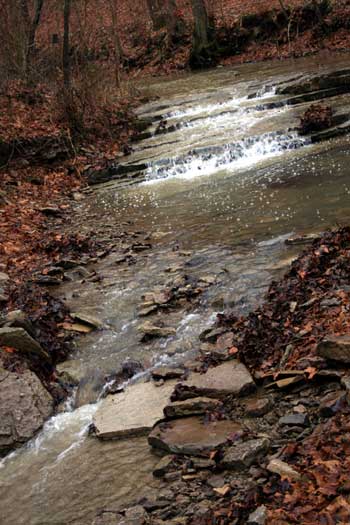
Gentle waterfall, Watts Ferry, Woodford Co., KY.
(*photo credit)
January 5, 2019 Resisting Expansion of Nuclear Power
Nuclear certainly appears to be the Phoenix (the mythical fire-bird, which dies in fire and is reborn from ashes). Nuclear energy promises keep reappearing with multi-billion dollar price tags, and we repeated such warning of extreme cost, unsettled retirement fees, safety and security problems, and unsolved disposal of waste materials. Nuclear processing is regarded by proponents as being greenhouse emission-free that is not quite accurate if basic materials mining, processing and transporting are included. Once functioning, the plants produce electricity with no carbon costs for a given period of time, but then what?
Environmentally, nuclear energy is a mirage when it comes to reported carbon footprint reduction. Actually, new nuclear facilities and equipment (even fuel processing) take extensive amounts of resources (steel, concrete, and carbonaceous fuels in production) to prepare materials and transport them to the site. Nuclear is not carbon-free and all technical people know it.
Yes, other environmental problems exist for this supposedly "clean" electricity source. From a security standpoint, the nuclear plant is a possible target for terrorism; the enrichment process is a constant temptation to aspiring atomic bomb promoters; the process of mining uranium has health and safety dangers; and the spent fuel remains a containment problem for centuries into the future.
Fiscally, a decade ago the nuclear industry dreamed of building one hundred new plants in America alone by 2030. A report was released by "Environment America" on November 15, 2009, Generating Failure: How Building Nuclear Power Plants Would Set America Back in the Race Against Global Warming. This report stated that the building of the one hundred power plants would require an up-front investment of $600 billion -- money, which if expended on renewable energy sources, could cut at least twice as much carbon pollution by 2030. The report noted that energy efficiency programs were already reducing electricity consumption by one to two percent annually in leading states of the Union, and the nation's wind industry was building wind farms equivalent to three nuclear reactors per year with existing funds (more now); that did not count expanded construction of solar, geothermal and biofuel plants.
Do we need these expensive six-(or closer to eight or nine) billion-dollar power plants that will be subject to cost overruns, insurance guarantees in case of accident, and the unsure disposal of expensive waste materials? With limited energy dollars, let's be reasonable and fiscally conservation. Let's concentrate limited financial resources into renewable sources and energy efficiency programs that are proving more environmentally and economically effective (nuclear electric capacity now dropping). Let's refrain from kowtowing to energy dinosaurs and special interests.
Prayer: Lord, teach us to avoid being wasteful in the use of all our natural and financial resources.

Winter colors of Chinkapin oak, Quercus muehlenbergii.
(*photo credit)
January 6, 2019 Epiphany: Questioning Peacemaking Right Now
War would end if the dead could return.
Former British Prime Minister Stanley Balwin
The wise men from the East questioned where the Christ child was located, for they came to bring peace offerings. We too are searching for the Prince of Peace, and we too ask where to find the Lord, the Prince of Peace. We have simple gifts and open hearts. But like the wise men, we too must be discerning and listen to the Spirit giving us new directions when needed so that peace will not be delayed or abandoned. The directions we seek are simple ones: Why are we making war in Iraq, Afghanistan, Syria, and Yemen?
Does a national threat spring from these four countries or is the struggle based on an industrial/military complex and the resulting profits? Certainly, terrorists from Iraq were not the same as those who bombed the Twin Towers. Are our enemies from Afghanistan or is al Qaeda actually centered elsewhere, in Pakistan? Are we being pushed by a combination of military weapons industries and some right wingers in the media and legislative halls? Most likely yes, but neither is a sufficient reason to continue or escalate Middle East fighting. Is there a materials security issue here? Iraq has one of the largest reserves of oil in the world, and so it is tempting to consider into whose hands that precious commodity will fall. In contrast, Afghanistan has something that threatens our security, poppies, and the resulting heroin and opium.
As individuals and as an American community we are seeking answers this year. Maybe our questions must be of a more searching nature. Does the very economy in which we are engaged demand military activity in which our American service personnel are merely pawns and knights? Is our economy in which military weaponry is a major component destabilizing the world? Could we find a better way to peace through attempting to secure the essential needs of people in every land? Do we not have the backbone to get out of Iraq and Afghanistan? No matter what the protestation of the Administration, do we still act like we are the police force of the world? Do we realize that this costly war game is breaking us financially and morally?
Do we seek the help of the ultimate Peacemaker and really strive for peace now? Do we listen to the Spirit telling us of the futility of military means and the greed of our material consumption culture? Or do we listen to the Herods of our age? Isn't it wise to continue the questioning throughout all of 2019? We need some answers in this time of undeclared wars for we deserve to see every police action justified and Congress act upon each with full deliberation. As peace-loving citizens let us demand more of our elected officials in 2019, for peace deserves a chance.
Prayer: Holy Spirit, show us the way to peace and help us have the courage to pursue new paths to bring this about.
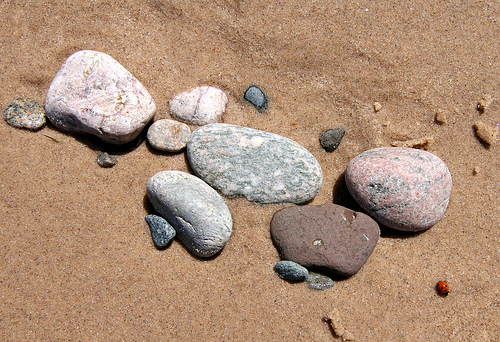
An assortment of weathered stones along Lake Superior.
(*photo credit)
January 7, 2019 Bear Arms, Not Ammo
On Plough Monday, there is nothing so patriotic as the image of a patriot leaving his plough to defend his country against invaders. Thus we propose and defend the constitutional right to bear individual arms -- which others in many countries find puzzling. Many Americans regard this as an individual right -- and responsibility. Others look at the arsenal as the community arms- bearing locus (as was Lexington MA in 1775). Of course, times have changed since the Constitution was written. Collectively we need security, but recall that many individual Americans such as tots and many of the elderly cannot successfully bear arms. Nor do we want the crazies to bear arms though many have access to them.
As a strict-constitution person, I hold that each of us has a right to own a musket -- we just do not have an individual right to the powder, since this should be in the regional armory -- along with the musket ball that can hurt someone. The massive shooting at so many places in the last few years make us ponder; how could partly or totally disturbed persons get so much ammo to shoot over one hundred rounds in a matter of minutes? Access to arms is a well-known fact, and we have millions in the NRA (National Rifle Association) who will remind us of our defensive needs as individual people, though these often hurt the wrong people. Then there are those who regard having arms in the home as a "Linus security blanket," without considering that these weapons are more often misused than used properly. Bear spray is more effective.
When I was a kid on the farm we blew post holes in our rocky soil by the use of a third of a stick of dynamite per hole. Obviously, during fencing season we often lacked necessary materials. Once my father called ahead and got a supply of dynamite and then asked me to pick up the caps during the school lunch break -- but not to broadcast the errand around too much. I stuck the purchase in my desk drawer until the bus took me home -- and never thought a thing about it. What would be the reaction today? Buyer, seller and bearer would all be in court. The school -- if not the town -- would be in lock-down mode. If folks get upset when a mercury thermometer is broken, what would dynamite caps do to a rather overstressed school administrator today? My own childlike response would have been, "Well, we don't pound 'Nitrostat' chest pain pills." I knew then and now that dynamite caps are not dangerous, if not struck on an anvil with a hammer.
Yes, the borne gun is not dangerous; it is the loaded gun. If each hunter were allowed one shot or two at most, and no automatic clips were sold, the world would be better off. The government ought to have the right to search the premises of all armed people and leave their guns but confiscate their ammo. What about the dynamite cap bearers? Maybe my youth was a little too carefree.
Prayer: Lord, teach us to serve others; help us to make the world a safer place where all can live in peace and harmony.
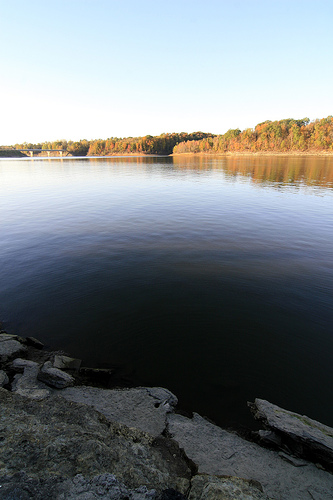
Still waters of Lake Cumberland. Pulaski Co., KY.
(*photo credit)
January 8, 2019 Distinguishing between Needs and Wants
We will speak much of sustainability of our way of life, our economic and political systems and Earth herself. We know there is a connection between the way we act and use resources and what can be available with little costs. Here communal and elementary needs clash with individual wants. People want freedom and need freedom; people want a good life and really need one to live as dignified inhabitants. People want to be spiritually satisfied and need to be, because of the human yearnings. People may want more material things (cars, boats and more spacious dwellings) and even consume resources from the common pool; people do not necessarily need these, and the acquisition may run counter to others who need the same resources to meet life's essentials of food or shelter.
We need to -- but do not always want to -- share, but by doing so we can fulfill our basic human longing for spiritual growth. However, this longing can be submerged by material wants: an inordinate impulse to fulfill the never-satisfied materialistic allurements all about us. A materialist finds the quest for spiritual fulfillment of little importance, since it does not satisfy his or her individual material wants. Such a person may ask "Why share goods with others?" However, the one who grows in spiritual ways will say, "I want the needy to be satisfied." Want has now been transformed to a spiritual and communal dimension.
In a material way, we are aware that material goods cannot totally satisfy; the want for more and more is always present. Those with some goods who lack a sense of sharing will be all the more inclined to take as much as possible, since in doing so they may somehow be satisfied. However, when this proves a difficult goal, materialists are moved to strive all the harder to take, grasp on to and influence the structures of society to legitimize their takings. Here the materialism of individualistic capitalism and certain forms of atheistic collectivism share misguided company; in both cases materialism threatens our fragile Earth.
In a spiritual way, certain collective "needs" include those of a destitute world around us. We become aware that a world where all basic needs are addressed is a safer world, a world less dependent on military security. In the same manner the "wants," which are considered in a pejorative manner when regarded as selfish interests, are transformed to mean the spiritual "wants" of those desiring to advance together with others as equals. This spiritual advancement requires self-abnegation so that we can acquire a public interest, the wanting of all to live in harmony. Revolution enters the picture when the spiritually inclined frustrate materialist’s goals that ultimately damage the balance that holds the social order together. Struggle surfaces but spiritual advocates must remain firm.
Prayer: Lord, teach us to know the difference between the needs and wants of materialists and those of the spiritually inclined. Help us to make the needed changes forthrightly.

Water droplets on gray dogwood, Cornus racemosa, after record 2018 rainfall in Kentucky.
(*photo credit)
January 9, 2019 Considering the Shared Commons
They hang the man and flog the woman
that steal the goose from off the Common,
But let the greater villain loose
that steals the common from the goose.
(English poem about 1764)
As part of one human family on this Earth we share much in common, and this includes the resources needed as essentials for higher quality human life. This fact of sharing is often overlooked. Some individuals or cultures regard themselves as privileged and entitled to use more of the world resources than others. But how are they so entitled and under what guise will they tolerate my countercultural question? These people claim for themselves resources that simply belong to all and, if there is entitlement, the resources belong to those in most need -- not those with the power to hold on tenaciously to ill-gotten goods. "Commons" means basic entitlement to what is required for the necessities of life -- and anything left over could be seen as a luxury for others. To say such an utterance is leftist is to forget it is simply human and Christian.
Throughout 2019 we will reflect on one or other of the elements we hold in common. For instance, as fellow inhabitants of our Earth we have a right to healthy air. One critic asked where such a notion of right to fresh air originated. I wondered aloud whether he was breathing or not. In fact, what was inferred by the remark was that smokers have a "right to smoke" and industries had the right to "use" ambient air in whatever manner they care. In that particular discussion the age-old conflict of rights arose. Attention turned to priority of rights, and the right to life has highest priority. Other rights include:
1. Water Commons January (Baptism, gurgling creeks)
2. Cultural Commons February (birthdays)
3. Air Commons March (breeze, wind)
4. Productive Land April (gardening, foliage)
5. Wildlife, Wilderness and Forests May (flowers)
6. Health & Safety June (outdoor activities)
7. Outer Space July (solar energy, space)
8. Maritime Commons August (vacation time, lakes)
9. Intellectual September (new school year)
10. Silent Space October (getaways and enjoying scenery)
11. Transportation November (travel time)
12. Communications December (renewing greetings)
This preliminary listing is suggested for each reader to occasionally review the many overlapping commons that we share with others. We have sought to consider seriously the commons in our work (Reclaiming the Commons), which can be found and downloaded free of charge by going to Brassica Books.
Prayer: Lord, show us the way to share with our global brothers and sisters, and to do so with a grateful heart.
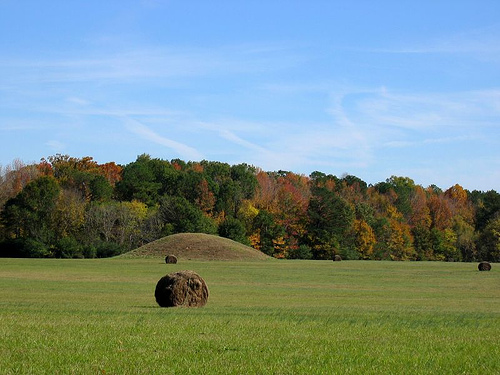
Pharr Mounds, Woodland period archaeological site, near Tupelo.
(*photo credit)
January 10, 2019 Promoting an Essential Needs Economy
We're moving ever so gradually to a renewable energy economy, but what does this all entail? Is it a mere substitution of solar or wind energy sources for coal and oil? Is a consumption-based material economy of whatever sort inherently limited because the resource that constitutes the base is of a limited nature? These materials require larger amounts of other resources to extract, process, transport, use and dispose of them -- and without proper safeguards this unsustainable practice can ruin our planet.
In its basic form materialism is ecologically suicidal! Thus those who profit from such a material economy take from a limited pie to which others do not have equal access, and fail to satisfy the needs of those without access. This is why a capitalism based on such a system is inherently unchristian and ultimately inhumane -- and a system must be developed where services are primary, not goods that strive and fail to fulfill human disoriented "wants."
Elements of such an "essential needs" economy include:
* Meeting basic human needs of all people, namely, potable water, sound and sustainable farm production of essential food needs, adequate housing for all, basic food in times of natural or human-caused disaster, and primary educational and health facilities for all;
* Creating jobs for all people to move the world to a better quality of life with competition not based on material profit motivation but on higher-quality motivation that has spiritual and intellectual profits as a goal;
* Upkeeping the nation's infrastructure and expanding affordable lodging to all citizens;
* Halting the disturbance of the natural environment, especially refraining from deforesting our planet;
* Replacing non-renewable energy resources with renewable wind, solar and geothermal -- and limited use of certain biofuels;
* Regulating the amount of resources that can be controlled or expended by individuals -- something that some regard as limits to freedom, but is really the expanding of freedom to greater numbers. Such limits could be affected by removal of tax havens, by taxes on excessive wealth and by confiscation of large-scale property holdings with redistribution to those in need;
* Providing access to proper health care to all citizens and not just the privileged few;
* Promoting educational opportunities, so that the full potential of each individual can be realized. A growth of intellectual capital is the goal, so that all may have the power to communicate and enjoy the greater fruits of culture and life itself; and
* Providing access to communications facilities to all, with freedom to exchange ideas and to express thoughts freely.
Prayer: Lord, help us to convert ourselves from a material consumption-based economy to one that is more oriented to the spiritual and intellectual capital of our people.
Focusing Amid Diversity on Climate Issues
Congress is now assembling, somewhat overwhelmed by legislative overload. Citizens need to keep themselves and elected representatives focused on major issues. Is a beginning HR 1 adequate to meet the horrendous nationally needed effort to aggressively address climate change issues? Citizens need to prioritize our information sources: Internet, TV, cell phones or periodicals. We must learn to be selective in what we consider to occupy our limited time.
Charity? Equality issues are interrelated with environmental ones because of the sheer power and influence of climate change deniers who are making profits in the outdated fossil fuel industry -- even while a movement for divesting from that industry has over one thousand participating institutions led by religious organizations. As pressure mounts ever so slowly to change to a renewable energy economy, a correlative question arises as to who controls the purse strings that are so influential in policy making. I have argued that such should not be by the 0.1% superrich who have their biases. Astoundingly, Thomas Sowell in "The Quest for Cosmic Justice" asks the same question, but opens the possibility that the few deciders could be specific governmental bureaucrats. A pro-affluent bias can emphasize the rich people's good motivations -- but what if they are also biased and yet have complete control of immense wealth? Don't these financial resources belong to those in greatest need -- and who are decision-makers? Legal title holders? Those with essential needs?
Monitoring of governmental activity is key to address those who think that the rich are entitled to be ultimate decision makers. Due to a strange past history the Pentagon successfully argues against public accounting, perhaps through need for military secrecy; the sad result of such secrecy is taxpayer bills for thousand dollar hammers. In these critical times monitoring that branch of government drawing $750,000,000,000 per year is long overdue. With greater transparency the people in charge must bear a legal responsibility to use taxpayer funds properly -- and this is not impossible. It will free up precious funds for infrastructural changes needed to usher in the renewable energy economy utterly necessary to control climate change.
Resources likewise must be diverted from waste to oversight, so that the funding is properly spent. This applies to legislative oversight committees to monitor military and other government money as well as to the Internal Revenue Service that has been constantly stripped of funds for expanded oversight capabilities. If the need is oversight then this is part of an ever-expanding task related to curbing global warming. A national policy is more than mere participation in international conferences and contributions to poorer nations with environmental problems; resolving planetary problems demands steps taken within our national governance priorities and active citizen participation.
Diversity can distract us, but we must admit that some diversity of policies is paramount to ultimately curbing climate change. First, there's the inequality prevalent in our culture of low taxes and tolerance of the super-rich who have such climate change denying influence on national policy; these individuals and corporations need to be subjected to strict and fair taxes. Second, there's monitoring governmental spending to focus on a "Green New Deal" type renewable energy economy involving removal of fossil fuel subsidies and benefits. Third, there's transfer of financial resources to a vast infrastructure program to cut energy waste, advance renewable energy sources and move to an electrified vehicle economy; this cannot be achieved without energy storage, grid modification and a network of electrifying charging stations. All of this is diversity still needed within a long-range focus.
Personal and social responsibility go side by side. Expecting others to do the tasks for us is certainly not a good practice in critical times. During these current weather extremes we can't expect the U.S. Forest Service to do "controlled burning" where people have stuck their homes in woodlands; this omits the responsibility that individual property holders as individuals or groups should remove combustible materials around their property. How do they expect a thatch-filled landscape to remain "safe" with weather extremes becoming more frequent? Don't expect a distant government to do the work here. Fire insurance companies are waking also.
Focusing is paramount and yet diversity emerges. This is a challenge in 2019 when the community of nations will address climate change more directly. Yes, as Jeffrey Sachs says, this neglect of the global problem by the current U.S. Administration is a "crime against humanity." Are we advocates calling for action in this important area while overlooking other issues, whether related or more distant? Activism demands return to priorities, and yet we need balance and sensitivity in our ordinary lives.
Planning brings order. I asked a semi-retiree once what he was going to do that upcoming week. His response was that he hadn't thought it out yet. How strange! Is he allowing social media or commentators or opinion-makers to direct his life? Who or what dictates the bulk of his free time? Certainly he and all of us should be flexible in times of emergency. But the challenge is to control our free time, and this takes discipline that free-spirited folks find hard to undertake. Caregivers may lack any "free time" and follow the Good Spirit's promptings. However, this current discussion fits more for those free of urgent dependencies, the great majority, who do have some daily free time.
Exercises of self-discipline are required to be active citizens; in winter with less chance to go outdoors it may mean fasting or abstaining from desserts or certain snacks. At day's end it means reviewing our activities and asking the Lord's blessings and forgiveness when we have stumbled. As citizens it means seeking harmony at all levels including the global one in order to hasten the Day of the Lord. Our time is precious.

Centipede found in dedaying log.
(*photo credit)
January 11, 2019 Preparing for the Growing Season Each year we set aside a January day amid the deadened winter landscape to conceive of the coming of a new spring garden. It is certainly better to plan ahead, and there is a certain life-giving satisfaction in making this a January task. It's interesting in yearly comparisons how we change in focus, how we age and mature, and how we tone down venturesome practices. Here's the 2019 list of suggestions to which you may want to add some hints:
* Explore the literature for new or improved vegetable or herb varieties, choose one that sounds most promising and resolve to make this a part of the 2019 gardening array;
* Consider the varieties desired for the coming year and omit those that were troubling last year due to too much or too little production, or other growing difficulties;
* Construct your growing list and select the new variety along with other seeds and plants from your own personal store or from a commercial catalog. This choosing has a way of reminding us that spring is soon coming and we need to be prepared for it;
* If you decide to grow some seedlings, now is the time to start. My great Uncle Louie would start a whole series of hotbeds for growing seedlings about this time in early January;
* Assess your willingness to do extensive gardening and consider the possibility that you need some help from an associate who can assist you. Don't hesitate to ask this soul mate to join in preparing soil, fertilizing, pruning and giving a hand with tomato cages and vertical gardening supports;
* Consider how much of each veggie variety is worth raising this year, especially if you have limited growing space. What are the approximate yields and can a surplus be easily preserved? Recall that while variety is great, a few okra plants are sufficient for the year, not an entire row of the stuff;
* Resolve when the season gets in full swing next month to prune the fruit trees and grapes in a more timely and fitting manner. Consider some soil testing to find any deficiencies and secure a source for manure in your organic enterprise;
* Turn the compost bin when the weather allows so as to awaken the earthworms for the tasks ahead; and
* Inventory the tools and equipment to see what needs to be better maintained or added to the gardening arsenal this year.
Prayer: Lord, give us the courage to enter fully in the preparation of the gardening growing season; help us realize with an upbeat spirit that there's always more things to do.
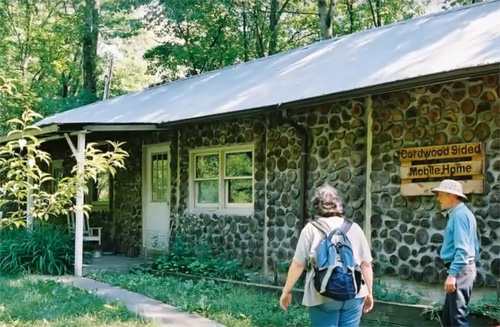
ASPI cordwood mobile home demonstration building, Livingston, Kentucky.
(*photo from Earthhealing Youtube video)
January 12, 2019 Greening Building Construction
There are various ways in which energy conservation applies to the home. One is through a variety of green building measures such as enhanced insulation and tighter design. The almost quarter century EPA "Energy Star Program" has done salutary conservation work and still continues even within the current Administration. However, like the rest of our consumption-based economy, there is another side to energy conservation even in building construction. Gradually over times of prosperity many folks want more space and larger homes, even while some older folks see the need to downsize and limit oneself to smaller amounts of living space. Increased housing space is expensive in terms of both building materials and the energy it takes to heat and cool these expanded structures.
If some get a star for building an energy efficient large home for two or three persons, is that really a saving if they are moving from a previous smaller one? Granted, a comparable-sized house is more resource costly if green methods are omitted; however a new "green" spacious structure is really more resource intensive. Few gets stars for down-sizing to smaller homes, even less efficient ones, but larger more resource-intensive structures could get stars for using this or that conservation measure. Rewards need to be distributed for down-sizing housing. This is the real sustainability issue during times of global warming and increased extremes in both winter and summer.
Once I brought this up at a meeting that was discussing green ideas for a new college building; the room of architects/builders would not even so much as talk to me, for I mentioned the green ideal of less space for all Americans: lodging, work, recreation, worship and education. How subversive! The difference in mentality among green builders and not speaking to anyone who questions the practice is partly why the world in which we exist is in crisis mode; too many want air-cooling and heating but in a spacious setting. We may "conserve" when a certain base line of extravagance is used as the measure -- but the measuring point and many of the measurements involve degrees of unsustainable activity. If someone is said to conserve by a wasteful society's standard, is this not our impending cultural "fiction"?
A green energy conservation program must involve designing and installing cozy space for the following reasons: less cost, less mortgage, less cleaning, less maintenance, less furnishing of rugs, less wasted space, less heating in winter, less fire and property insurance, less cooling in summer, less security demands, less ostentation, closer connection to others, better witnessing to simple living, and more things within easy reach. Of course the reduction in guest accommodation could be compensated for by camping, commercial lodging or making space in unused rooms. We need to think small even when it takes extra effort.
Prayer: Lord, teach us honesty in conserving resources in all aspects of our lives.
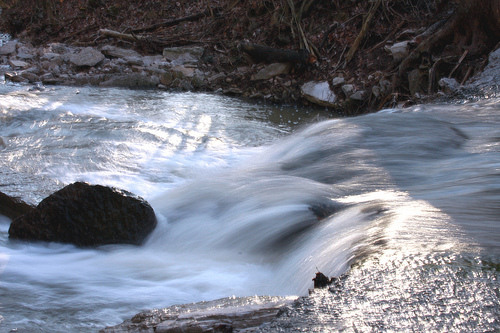
Rapid capture of flowing stream, Franklin Co., KY.
(*photo credit)
January 13, 2019 Cherishing Our Baptism
I formed you and set you as a covenant of the people.
(Isaiah 42: 1‑7)
Christ was baptized by John the Baptist and is called to a ministry of loving service. Our own baptism was our life's most important moment apart from our physical birth. We were spiritually reborn and became a member within the Divine Family.
Isaiah speaks of the Servant of Yahweh, and that voice of so long before has been applied to Jesus and his public manifestation or the second epiphany. Jesus is committed to a life of bringing about change in the people, upsetting an entrenched established order, announcing justice for all the people, a light to the nations, and a liberation of captives. In a very real sense, this is a call to revolution, for the old order is no longer valid; it must be changed, and Jesus' baptism is the initiating event.
In today's reading Peter (Acts 10:34‑38) comes to a realization about his own ministry as a continuation of the ministry of Jesus, now being further extended to all God‑fearing nations and peoples. The ramifications of this obedience to the call are hardly known, yet we return over and over to our original call, to the point of a beginning, to the grace that launches us on our journey. Peter recalls the beginning of Jesus’ call to ministry when the Spirit came down upon him in the form of a dove and the voice came from the clouds giving a divine stamp of approval. Here Peter speaks for all of us in saying that our mission is linked to that of Christ's revolutionary call to begin a process of global liberation. Peter becomes aware that he is part of this liberating process, and the people say "Amen."
Jesus goes into the wilderness to be baptized by John, and thus the wilderness is the place for radical change. John, the radical in lifestyle and in proclaimed message, is the forerunner, the one who prepares the way for the Messiah. Jesus connects with John and manifests the public nature of his own ministry; his act of being baptized shows solidarity with the people seeking to change their individual lives. Jesus does more; he initiates in his baptism a radical change in the entire world order.
On our part, we are radically changed through baptism into a new creature, a member of God's family. And furthermore we are formed into a new people who carry on the making of God's kingdom as part of the Body of Christ. When Jesus is baptized and the heavens open up, the Holy Spirit descends upon him and the divine Godhead speaks a public affirmation. We enter the spiritual wilderness, needing to become countercultural to the world around us; we open ourselves to follow the Spirit where we must go.
Prayer: Lord let us see the power of the grace of our Baptism/Confirmation and act accordingly to bring about change in our troubled world in the manner that you direct us.
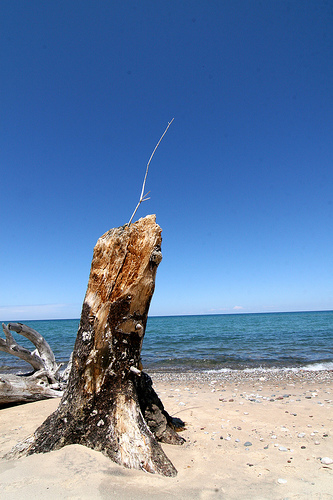
Lakeside view, near St. Ignace, MI.
(*photo credit)
January 14, 2019 Providing Health Care for All
On the great African medical missionary, Albert Schweitzer's, birthday, it is fitting to consider the unmentionable -- health care rationing -- something like talking about underwear styles or defecation conditions. Well let us be frank -- we already have rationing of health care. The privileged can get the best care, best doctors, and best facilities. The poor get less care, and the uninsured can barely do more than go through the emergency doors. Perhaps this will change with a proper health reform, but not totally. We need to discuss health care in moral terms as something for ALL the people, not what the privileged few might receive. We must broaden the field and confront the reality of rationing as part of the total health facility rights of people.
Broadening the field means expand the concept of health care to all our brothers and sisters throughout the world. Unrealistic? Hardly so, if what we are talking about is the minimal care that would allow people to avoid preventable diseases such as malaria and many tropical diseases. To expect to give all people from all lands the privileges of the Mayo Clinic or the best health facilities now present in this country is unrealistic. To provide fifty dollars for immunization and preventable malaria netting and other basics globally would take only one-sixth of the world's military budget, and that transfer of resources could be achievable through global cooperation, total security concerns and will power -- and far better ultimate security than sophisticated weaponry.
Rationing of health on a global level may have to be accepted, not to exclude some but rather to include all. We hope all nations will now be able to provide basic health care, remembering that a number of these unfortunate lands, including Haiti and some African nations, have more personnel working in North American and European health facilities than in their own impoverished health facilities. Rationing may mean returning these people (with some subsidies) to their native lands and seeing that minimal health care is provided to all. Of course, with time the concept of "minimum" may rise and expand, along with accepting rationing in order to redistribute wisely; this is better than to pretend rationing does not exist. Health care like fiction is fraught with flights of fantasy.
Health care for all may be a dream away, even after we are gone, but that goal is to be sought if we are to answer before God for all our privileges. Some will say such dreams are too expensive, but how do you value an infant's death through a preventable disease? Let's face it: all have the right to health care, but we must accept that there are limited health care facilities here and now. Making these more and more available is a realistic dream; converting resources now used for disposable consumer products and military hardware to health services is realistic and just -- even though it will take time. We have to start thinking about these things here and now.
Prayer: Lord, teach us to proclaim health care for all.

Ohio buckeye, feast for squirrels and other animals in winter..
(*photo credit)
January 15, 2019 Fighting Hunger Here and Now
Opulence and waste are unacceptable, especially when hunger -- the cruelest form of poverty -- continues to rise.
(Benedict XVI's address to the United Nations World Summit on Food Security in Rome on Nov. 16, 2009)
Food security means access to sufficient quantities of food to alleviate hunger in all parts of the globe. Many people do not have access to food markets and adequate supplies. We ought to become aware of facts about current hunger and how to combat it.
Basic facts include:
* UN Secretary Antonio Guterres last year called for $22.5 billion for saving some 20 million people from starving. It came at the time the US President called for a major reduction in UN funding. Shame!
* In the United States about one-seventh of the population has had to curtail eating habits due to lack of funds or access to food supplies. This when some want reduced food aid. Shame!
* American food pantries and distribution centers have had difficulties in the past year keeping a basic stock of foods to meet family crises, some of which I experience firsthand.
* Food prices rose in the last few years due in part to the competition for limited grain supplies, and in part because one- quarter of American corn production is converted into biofuels.
* Food shortages do occur in parts of the world, but the total global supply of food is adequate for feeding the world's people.
Ways of alleviating hunger include:
* Support the United Nations and all private charities programs aimed at fighting hunger;
* Assist groups that are helping with local small farm assistance and development, for the most secure source of food is the local community. Charitable agencies are assisting with land, seed, fertilizers, access to markets and fair trade;
* Call on our government to assist with road and regional transportation system development, making more locally grown foods accessible to nearby urban populations;
* Influence youngsters to give direct donations to food aid for natural disaster victims by use of "Rice Bowl" and other programs, especially those featured as Lenten exercises starting next month;
* Support Oxfam America <www.oxfamamerica.org/give> and other authentic charitable organizations;
* Reduce food wastes at all levels from lunch rooms to home kitchens; and
* Eat less meat. Promote better utilization of foods at all levels. Direct consumption of grain is far more efficient than converting grain to animal meat, milk and eggs.
Prayer: Teach us, Lord, to see that enough food is present, and that our efforts ought to be devoted to fair and just food distribution to all peoples in need.

Cross-section of wood, intricate lines.
(*photo credit)
January 16, 2019 Eucharist: Memorial, Cosmic Mystery and Food
On Religious Freedom Day we Christians consider the bonds of love drawing us together as one Body of Christ in an ever deepening Mystery of our shared Faith. We recall the saving deeds of Christ, remember the pledge of future glory, and become nourished with food to sustain us in the troubled present moment.
Memorial from the past: "Do this in remembrance of me." The Liturgy extends the passion, death and resurrection of the Lord in space and time. The "Breaking of the Bread" (Acts 2:42; Luke 24:21) is a recall, a remembrance, a transcending event and presence of what occurred two thousand years ago and is now in current space and time; "there and then" becomes HERE and NOW. The Holy Land is now extended to the entire Earth; Calvary is today. We are no longer mere spectators of an historic event; we are participants in a cooperative endeavor as members of the Body of Christ. Christ gives himself to the Father and then to all of us. From that historic past through the apostolic succession involving the laying on of hands, the ordained priest consecrates bread and wine into the Body and Blood of the Lord.
Cosmic Mystery of future glory: Teilhard de Chardin had a vision of Christ's body in the entire universe as he celebrated Mass at the altar of Earth. John Paul II speaks of a Cosmic Act that unites Heaven and Earth "permeating all creation." Something is coming to be for those with eyes of faith; the Kingdom comes and a future promise is occurring in our present world. The mystery that is unfolding before our eyes gives us the thrust to carry on, to believe in a meaningful future, and to act as catalysts to accelerate that future, to "look forward to the day of God and speed its coming." (II Peter 3:12)
Nourishment is needed to bond us within divine love, and thus the sacrifice in which we participate is also a meal. The mystery of being called to assist is overwhelming. The saving task before us as People of God is so utterly important that we are unable to act without a food that is "Godself," nothing less. A mere symbolic food would simply be a recall of past events; a future hopeful horizon is not enough to sustain us in the present. Nothing will suffice except food, the bond of Charity, the Lord's Body. In this paschal banquet we are empowered with the risen Lord, renewed with a promise of ultimate glory, and energized by actual food that is Christ's person, a gift par excellence, the Sacrament of Sacraments. "If you do not eat the flesh of the Son of Man and drink his blood, you will not have life in you." (John 6:53) Just as St. Athanasius reasoned that only a Christ, who is God, could redeem and save, so as participants in the saving act of Christ, only those nourished by divine food can so act. We do not act alone, but join in a community of faith, thanking God for inviting us to engage in "the work of the people."
Prayer: Lord, teach us to come and share together in your divine work and carry your presence to the world.

Thompson Creek, rural Anderson Co., KY.
(*photo credit)
January 17, 2019 Defending Our Water Commons
As mentioned on January 9, we consider the commons from a variety of different monthly aspect. We have celebrated Jesus' baptism and realize that each of us is saved through water -- and thus we are more spiritually inclined to save the water. A decade ago, experiments of crashing a rocket into a crater near the southern pole of the moon brought forth a cloud of dust and debris that contained water, "moon water." It was like discovering gold, for now exploring this otherwise lifeless heavenly body is at least a little less complicated with water present, for life processes and sustainability require water. Creeks, rivers and other forms of moving water manifest the flow of life itself. In these crisp winter days (when above freezing) the sound of flowing water seems to add special charm to the season. Gurgling streams and rushing rivers, even in mid-winter's rest, are signs that new life is coming forth, although in frozen landscapes it is imperceptible.
The supply of potable water is a limited resource, which is all the more scarce because of expanding population demands and higher resource consumption. In some parts of the planet free drinking water at village fountains is giving way to expensive bottled water that is obtained from soft drink-dispensing machines. Running water in natural streams was always regarded as a common property, but this is challenged today by property rights groups. The shores or riparian rights have been claimed as property by individuals; the water rights have been allocated to large farms or corporations; more powerful forces have tapped in and drained the water for their own uses, privatizing water at a profit.
We have a right to water; we also have a responsibility to refrain from returning "used" water in poor condition to the environment. Horror stories about polluted water abound: in the 1960s the Cuyahoga River near Cleveland caught fire; India's sacred Ganges is becoming a sewer, downstream from a host of untreated sewage sources; some of China's major rivers are now laced with heavy pollutants; in Appalachia until recently "straight pipes" led directly into creeks with hopes that "dilution is the solution to pollution." Rivers are drying up before they reach the ocean (e.g., the Indus, the Colorado, the Yellow, and the Rio Grande). The Jordan is a brackish streamlet before it reaches the Dead Sea. Livestock in large numbers pollute flowing streams; fertilizers and pesticides pollute running streams and aquifers. Motor boats add petroleum products and emissions to the water bodies in which they operate.
The almost endless listing of ways in which water is contaminated makes us all the more aware that aggressive ways must be devised to ensure good drinking water for all and a plentiful supply of this precious resource for irrigation and commerce. Our water commons calls for awareness, respect and preservation.
Prayer: Lord, teach us to use our more precious resources wisely and to ensure that potable water is accessible to all.
Threats to American Democracy
A little over a month ago 44 U.S. ex-senators wrote a joint op-ed in which they warned against the possibility of our democracy being eroded; they urged the U.S. Senate to reaffirm safeguards for what our country has held sacred since its founding. We should consider these threats to our nation and world as directly connected to the need to focus attention on climate change and our American participation in the 2015 Paris Accord, which is becoming fully operative this year.
Beware of a Crime Against Humanity. If this nation's failure to address the world community's climate change curbing crisis continues, in twelve years time will be exhausted for preventing a major catastrophe (a three degree Celsius global temperature rise by 2100). Failure to act by our citizenry and their elected representatives in collaboration with concerned citizens in other lands will damage if not destroy our inherited democratic values. Yes, we can still act and apply pressure. The Administration must change its ways rapidly and allow the weight of our U.S. participation to influence the global picture and stop the damaging climate change denial by Big Energy.
Do not tolerate billionaire influence. Most people fail to recognize the four nations ("the axis of evil") which opposed supporting scientific evidence for dealing with climate change at the December meeting in Katowice, Poland (COP24). The four are the U.S., Russia, Saudi Arabia and Kuwait. These four had two things in common: they are massive petroleum producers and they have the greatest economic inequality among nations. Tolerance of this inequality among the ruling structures in these countries allow the climate change deniers to soften national policies in addressing this global issue. Our democracy erodes before our eyes when these profiteers get away with murder. They prolong the existing fossil fuel economy and their own perks, tax benefits and havens and fuel subsidies through autocratic leadership and intimidated legislative bodies. To allow this situation to continue unchallenged is to commit possible national and global suicide.
Tax reform is delayed. The two legislative branches of our Federal government are not now in a cooperative mood. This leads to paralysis on tax matters at a time when overspending and need for constantly raising the deficient limits lead to a partial government shutdown. During a period of low unemployment and robust economy growth indebtedness of nearly a trillion dollars a year is utterly unsustainable and this threatens our democratic process. The solution is to promote fair taxes to where the wealthy pay their share and begin projects such as infrastructure maintenance and improvement in transportation, electric grid expansion and subsidies to a "Green New Deal" to bring on a renewable energy economy. This is doable if Congress would have the courage to act in a bipartisan manner and promote genuine tax reform. The new HR 1 is promising legislation in the making.
Voting restrictions and antagonism add to paralysis. At a time when more and more citizens are needed to comment on critical issues, a movement to restrict voting times and places is growing. These restrictions are deliberately imposed in order to discourage minority and lower income voters who may oppose ruling elites. Rather, for a healthy democracy more times and places ought to be available for participating so that a maximum number of eligible voters will exercise their civic duties.
Many citizens are fearful of violent and uncivil confrontation at political meetings with candidates and elected officials; they prefer to stay home rather than become highly disturbed. If less mobile, they may fear the possibility of hostile crowds -- and consider it best to avoid political gatherings where democratic exercise ought to be expressed. This current lack of civility harms the spirit of peaceful assembly and reduces those willing to attend. Ralph Nader's book, To the Ramparts: How Bush and Obama Paved the Way for the Trump Presidency and Why It Isn't Too Late to Reverse Course, calls for citizens to demand their legislators to meet with them and hear their complaints. If this were done in greater numbers, legislators would hear real issues and not constantly be listening to lobbyists as though they represent the voice of the people. One of our senators has never come to our county and spoken directly to the residents; he only offers occasional columns on issues in the local newspaper.
Our failure to follow through. Granted, many concerns flood our waking hours and make us easily prey to "Issue Fatigue." We sometimes think our signature on a petition will be sufficient for a resulting solution, and then find to our surprise that it is one of a list of many petitions -- with hardened climate change deniers still in power. Our insistence here is to stay focused on the big issue with its impending disaster beyond the horizon and with detrimental efforts already being experienced. Let's continue this social media campaign by telling friends, calling and writing letters to urge others to join us in contacting policy-makers who can make a difference. We must continue the fight by overcoming a temptation to turn to allurements to consume our attention.
Intimidation hurts all. Our current challenges cannot be ignored. Failure creates a national depression, which can smother an optimistic atmosphere that says "we can do it." The issues appear too big for us! For the sake of sanity we accept the need for some diversions and hobbies. The breaks are needed to be effective under harsh conditions, for we do aspire to be models for an upcoming generation. Balance is a key word in these times. Not all is doom and gloom; the bright horizon is just around the corner if we help create it. By lightening up we keep the world from sinking into more darkness. The intimidation of those deniers in power for the last few years must be confronted in a forthright manner. Let's resolve to work together to change the global situation to make this a better place for all people -- and do so in a democratic manner with full participation.

Purple passionflower, Passiflora incarnata. Memories of warmer months.
(*photo credit)
January 18, 2019 Circles within Circles: Praying for Church Unity
May they all be one. Father, may they be one in us, as you are in me and I am in you, so that the world may believe that it was you who sent me. (John 17:21)
Every January a large number of active Christians pray on eight successive days leading up to the feast of St. Paul for unity among Christians. This ministry to seek unity (ecumenism) is focused on the commitment to Christ by the over two billion in the world who call themselves Christian -- but in a broader sense this extends to all faith-oriented people throughout the world (interfaith cooperation). The entire family of human beings and all creatures need to draw to ever more embracing circles of unity.
The thrust for unity among Christians is based on the firm belief that we all share one baptism and faith in one Lord of all. As Christians we share many other beliefs; within a particular religious group there are ever wider circles of communities in regions, nations, continents and the world. And to this is overlayered the circles of fellow Christians who are not of one fold, but still recognize belief in one Lord and God. This broader circle embraces approximately one-third of the human race. One image is that of a head of cabbage with inner cores and with overlapping looser leaves. Such material representations suffer from physical limitations just as much as does a three-leaf clover (the Trinity) that St. Patrick used to teach the Celts.
We work in our inner core circles on mutual sharing and support in what we strive to do together -- and this takes an intimate unity of connection and well-being at a very personal level, a sacred communion of believing people. As we move out from this we find that our unity is based on love and mutual interests that hold local communities together. Tighter and more sharing communities are able to extend their bonding to wider communities as through a ripple effect. As we grow in love for our neighbor, we become concerned about their physical and spiritual welfare.
In addition, we must work together to fight food insecurity so as to reduce suffering and allow all people a higher quality of life.
Conflict and friction can frustrate our unifying efforts; hatred and bias tears us apart and increases isolation. We are all familiar with the bad effects of disunity, whether at a local level or by a 9-11 type event on a global level. Our unity prayer is for the love that the Father and Son experience might extend to our personal relations. Jesus calls us to become one so that this unity can be the sign of what we profess, namely the unity of the God who loves us. Building the circles of unity may be frustrating at times, but we are vowed to continue the process, knowing that this unity is possible.
Prayer: Lord, give us the courage to be one, to work together in love, to seek support of all, to build a better world that cares for everyone, and to work together to heal our wounded Earth.
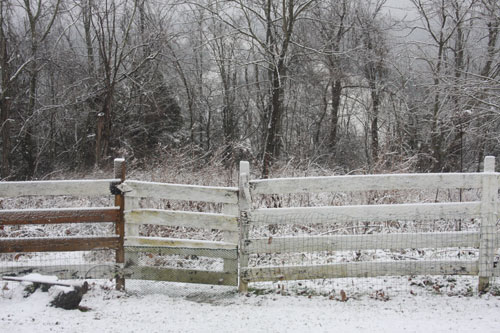
Dusting of snow on farm fence. Anderson Co., KY.
(*photo credit)
January 19, 2019 Giving Thanks for January's Blessings
In the middle of winter many say the hardest challenge is to find special things to be thankful for, for self-pity about the raw weather can become all-prevailing. However, gratitude is always needed even when temperatures fall and ice covers the walkways of life. Finding the things to be grateful differs with individuals, but these suggestions may trigger your own January thanksgiving listing -- and the subjects are never exhausted:
* Inclement weather, which makes us appreciate the gift of physical mobility when we can use it by getting outside more often. The cold weather heightens our anticipation of the coming spring;
* Geological forms around, accentuated by lack of foliage or by the covering of snow or ice with graceful natural works of art. We come to appreciate the natural shape of the various bare trees and discover a hidden beauty here;
* A star-filled night in coldest winter, which has an inviting atmosphere that summer and other seasons do not give, for we are drawn to look heavenward with a far deeper sense of utter awe at the immensity of the universe;
* The silence of countryside while snow is falling has no other equal throughout the year;
* The newly snow-covered landscape when the sun finally breaks through, with an entire countryside filled with sparkling icy diamonds, rubies, sapphires and emeralds of every imaginable design and pattern. Light gives us the bountiful gift of itself for all to discover gratitude;
* The sharp sounds of flowing water in creeks and streams have a special enchanting ring in wintertime;
* The freshness of a landscape covered with new-fallen snow and the surrounding atmosphere exudes a scent that is specific for the season;
* A hot meal, which means so much more on cold days than at other seasons, and thus we need to savor the tastes that can be brought out with creative recipes and cooking techniques and especially with new and creative soups each day;
* A hoot owl's call making winter sounds so much more emphatic and focused than when the world is alive with nature's varied sounds during summer and the warmer and more active months of the year;
* Holly bushes with green leaves and bright red berries give color that is needed in this less dramatic season;
* The long darkness that makes sleep all the more restful, with all the dreams that seem ever so much more pronounced in the winter nights; and
* The colorful cardinal and bluejay who choose to remain through the winter months along with less colorful cousins who are brave enough to give a permanent witness to nature's companionship.
Prayer: Lord, teach us to respect all creation, even in the more silent times of the year, and to show this respect through thankful thoughts, words and an occasional smile. Spring will come if we await it with patience.

Grass seed pods at the garden gate.
(*photo credit)
January 20, 2019 Celebrating the Cana Event in Our Lives
(John 2:1-11)
There was a wedding at Cana. We know nothing about the wedded couple, only that the Mother of Jesus was there; Jesus and his disciples were also invited. Our Christian life starts with the celebration of Baptism after our vows to follow Christ; we punctuate our journey in faith through special events. We are steeped in joy and celebration; he is risen; we are in his company and we are called to be the body of Christ, a New Creation.
They have no wine. Mary's keen observation of distress on the part of the wedding party is confronted by Jesus' response that his hour has not yet come. But just as she ushered him into the world through her "yes" to God, so she as first Christian believer is confident that he will act. His moment now arrives, for through her encouragement she brings on his "hour." NOW, great things will happen. We know that as the body of Christ we can act as well.
Fill the jars with water. Jesus is performing a miracle, and the Old Law's jars of purification become the abundant wine of spiritual blessings. We are called to fill the thirst of the members of the people of God with good things. We may not be miracle workers, but we can be wonder workers -- revealing the wonders of sharing with others in love. We need to encourage each other, for sharing takes more than one. The best place to start is the liturgical celebration. It involves the realities of life, the better or worse, the crises and the joys.
The headwaiter tastes the water that has become wine. He knows little about Jesus, his origins or his intentions. We must make the ordinary things of life (water) something better (new wine). Our lives are invitations to show the power of the risen Lord now acting within our worshiping and sharing body. We bring new "wine" in creative ways to confront dangers and respond to human needs. "The sign of water into wine at Cana already announces the Hour of Jesus' glorification. It makes manifest the fulfillment of the wedding feast in the Father's Kingdom, where the faithful will drink the new wine that has become the Blood of Christ." Catechism of the Catholic Church, p. 337.
This is the beginning of Christ's signs. We who are present in a worshiping community are public witnesses to this act of spreading the Good News, of bringing Christ to the world. We may be the ones sent or we are the ones who through good will and prayers are the senders and the ones who listen to the words of those who receive the Word. The community becomes a sign of future glory, for in joyfully receiving the Word, we proclaim the message received to the world. The process is ongoing. When we hear the Lord speaking, we listen, we respond, and we proclaim.
Prayer: Lord, inspire us to find room to celebrate your presence among us, to find time to relax, and energy to spread the Good News, and to grow in joyful celebration with others.

Caterpillar navigates rough bark, Bernheim Forest, KY.
(*photo credit)
January 21, 2019 Hugging a Tree?
On National Hugging Day some have asked, did you ever hug a tree? "Come on, be honest about it," they will say. My response requires qualification even before the answer. I do hug trees as part of practical -- and not emotional -- purposes. Yes I have hugged people to show affection -- and the same for certain animals that do not bite. Please understand why I occasionally hug a tree:
The entire length of my arm span (each arm stretched out to the full extent is six feet within a half inch; from each of my middle finger tips to the elbow is almost one foot and a half or eighteen inches; each outstretched hand from middle finger tip to wrist is eight inches and each little finger to its first joint is one inch, and to its major knuckle joint is two inches. Yes, the foot length, the "step," the "pace" and the stride” will really bore you. All in all, without the use of our own body's measuring instruments, many of us compulsive counters would be terribly frustrated on a number of occasions when lacking mechanical tools.
Back to National Hugging Day. I have been able to measure the girth of a tree to within an inch of accuracy by the initial hugs and tugs that it takes to move from point to point. Believe it or not, I measured one tree in central New York near Albany that took three six-foot "hug spans," plus more measurement of body parts as well to determine the massive circumference (almost twenty feet). The mode of measurement is a sure thing; retention by an aging mind of what gets measured is more problematic. However, the fact that I measured the tree is a sign of respect and love in its own way -- and we established its girth for an Environmental Resource Assessment report we performed.
An added note: Measurements come in many proximate ways, and thus "hands" (for measuring horses) is one of the multitude of old English measuring systems, all based on some common sense general measurement. Remember your own body part size will differ from mine, so I suggest that you develop your own system with the aid of a ruler or yard stick. You may want to go international and put your length measurements in meters, and that is all the better. Or you may want to always carry around a measuring tape and that is commendable but cumbersome.
Back to hugging. Many people and animals certainly deserve an occasional embrace. We seem to forget that an occasional hug may be all that it takes to get through the troubles of our world, so think of others and their needs. I am unsure of the plants of this world, for they are far less sensate. However, these plants know to some degree whether we appreciate them, but our appreciation need not be so expressive as a hug. It is hard to hug a clover or a blade of grass. Stay with trees.
Prayer: Lord, I am convinced You hug this universe with your broad embrace. Teach us to love in the best way we can and to show it, especially when others are in need.

Tender blossoms after unseasonably warm weather. Harlan Co., KY.
(*photo credit)
January 22, 2019 Anticipating Climate Toll
In a British Broadcasting Company interview a renewable energy researcher stated in despair that the Earth is already on an irreversible route to destruction and there is no remedy possible. He said we should have acted sooner. His pessimistic conclusion is itself part of the "climate toll." Publicly saying that it is too late, especially among articulate and sincere people, creates an atmosphere of disbelief and negativity. Such lack of faith in the future can result in a variety of escapists launching into all sorts of perverse behavior. That is at a time when their own energies are so utterly needed in saving our troubled Earth.
Some of the most recent United Nations' reports state that the Greenland ice sheet is melting far faster than had been predicted even at the turn of the century. If the entire sheet were to melt in the next several decades, the oceans would rise by nine meters or about twenty eight feet. There would be a lot of flooded coastal areas including the permanent flooding of several Pacific and Indian Ocean nations. Talking about global warming in the middle of winter tempts us to say -- "bring it on." (It is 16 degree Fahrenheit at the time this is being reviewed). However, such a comment is a temptation, an escapism in itself. Actual global climate rises of 1.5 to 2 degrees Celsius is a frightening possibility that some are saying will be exceeded.
In the European heat wave of 2003 it was reported that in August the heat wave killed 14,802 in France, some 4,200 in Spain and Italy, 1,300 in Portugal, 1,400 in the Netherlands and 2,050 in the UK. Yes, that summer was the warmest ever recorded in the northern hemisphere and especially in normally cool Europe. Since then the continent's people have taken safety measures -- and the world has experienced a dozen warmer summers. Extremes such as in the hurricane seasons have resulted in frequent "hundred-year" events virtually every year. The problem is the pattern and the average rise in temperature of oceans and land. This pattern is what concerns climate change scientists, not a particular event.
We know that climate change affects the most vulnerable parts of the world and thus sufferings are in store for us this year, though we do not know where or how severe. The poorest people lack escape routes, adequate food and shelter and other aspects of a higher quality life. Natural disasters are costly, but can be softened (see January 4) with commitment. We do not throw up our hands and say it is too late. We can stop deforestation, launch a renewable energy economy, move the most vulnerable away from the flood zones, and conserve the limited water supplies. The world needs our concerted efforts, and people can change in time of crisis, but we must have faith in the future. We must do all we can to fight pessimism that says nothing more can be done.
Prayer: Lord, teach us concern about the least of our brothers and sisters in this time of climate change. Help us to combat sterile pessimism by a realistic path to sharing resources.

Reaching for the sun. Red River Gorge, KY.
(*photo credit)
January 23, 2019 Supporting Renewable Energy
On National Pie Day we ought to consider slicing the energy pie so that we come more quickly to a sustainable energy economy, that is where larger slices of the total energy pie is renewable energy. At the beginning of last year the U.S. Federal Regulatory Commission said that proposed net additions t o generating capacity by utility-scale wind and solar could total 116,000 megawatts by December 2020 effectively doubling their capacity in a little over three years. As of last reporting all renewable energy sources -- hydropower, biomass, geothermal, solar and wind is rapidly moving from one fifth to our fourth of generating capacity. To be fair natural gas capacity is also increasing rapidly due to accessible low-cost fracted product.
The fastest growing of the renewable energy sources is wind with solar energy sources coming on rapidly through lower prices. Much of this expansion is in higher quality wind areas, but due to rapidly improving wind generating equipment, even areas of moderate wind quality are showing substantial increases. Minnesota, a moderately endowed wind state, is now a leading state in wind- generated electricity. Differences in quality are diminishing due to better wind generating equipment. Another factor that has been somewhat overlooked in the past is the immense offshore wind potential on the eastern Atlantic Coast. Some estimate that within three decades the Northeast offshore wind farms could supply enough gigawatts of electricity to the energy deficient Northeast to allow the region to be self-sufficient if not an energy exporter.
In addition to the drive towards capturing wind, much recent expansion is being made in geothermal in California and much of the West, in solar energy in the South and Southwest, and in the research into biofuel alternatives such as switch grass and non-food cellulosic plants and wood waste. Small-scale hydropower plants are either being reopened or installed through federal economic stimulus package money moving to various states. The high costs and dangers of nuclear power plants have made many electric companies refocus attention on renewable energy sources. Solar is not far behind the surge for wind electric generation, and offers another good non-polluting energy source -- and a portion of this is not directly connected to the national energy grid.
The renewable energy future is bright, but the question is whether it can come on fast enough to satisfy the rapidly expanding demand for more electricity worldwide for industrial purposes, enhanced public lighting, the growing demand for air conditioning in summer, and the increase in electric vehicles (over a million produced last year alone). Improved transmission systems now being constructed will allow renewable energy to be more easily transferred from sources to points of use. We ask again, will these changes come fast enough to reduce and halt climate change?
Prayer: Lord, You renew all things; help us who seek to heal our wounded Earth by promoting green renewable energy.

Carolina wren, Thryothorus ludovicianus, at suet feeder, Estill Co., KY.
(*photo by Sally Ramsdell)
January 24, 2019 Taking Responsibility Individually & Collectively
"If you don't work, you don't eat. That is St. Paul's basic comment to his faith community members who considered sitting back and await the coming of the Lord. Some say openly that the lack of collective or individual responsibility is destroying our social networks. I note in various instances with the very young that when they are asked whether they are sorry for their wrongdoing they hesitate in bewilderment. They had never confronted personal responsibility in their lives. But that does not hold just for the young; most adults would say that wrongdoing is on the part of others, and that they are almost or always never to blame.
Our troubled Earth suffers from lack of taking responsibility, from denying the problem, excusing ourselves and escaping to something nicer. Failure to take responsibility is destroying ourselves and our planet. Climate change is the result of the privileged class feeling comfortable in consuming for their profit-making purposes what belongs to all, both present and future generations. Simply buying off our wrongdoing such as exotic travels, by "caps and trade" or carbon offsets is shifting from personal responsibility to escapist techniques.
Some expend resources for self-indulgence. Others, who are at the service of society, may calculate their resource expenditures (e.g., fuel used) against themselves as individuals. Coast Guard- cutter operators serve a regional, national or global defense system; thus, resources they use ought not to be attributed to them as individuals, but divided among the public served. That is precisely why per capita statistics on resource use are so imprecise and even verge on being meaningless except for crass resource wasters. Both expenditures and responsibilities become muddled when considering social resource costs.
Now back to taking responsibility. We prefer to do superficial acts (recycling bottles) and to forget the big picture. A democratic society is NOT one that allows individuals to do as they please, that is, freely waste resources as they choose; a democratic society must enforce good behavior, especially when the conduct of the wrongdoer highly affects the Common Good. We must take a middle ground between voluntary individual responsibility that a few do well and a totalitarian state with all in lock-step.
The middle position is to take positive steps to force behavioral change from a collective standpoint and not allow wasters to continue damaging our Earth. Tolerating wrongdoing is never an act of freedom, only license -- and there is a difference. Let's speak up for social change and curbing privileges that exacerbate catastrophic climate change. Big Energy must be controlled so that we move to a renewable energy economy.
Prayer: Lord, teach us to take responsibility, not only on an individual level as practicing believers in the future, but as citizens who are responsible collectively.
Fundamental Change before any "New Deal"
Reports circulated in the middle of December by the "Sun Day Campaign" say that the current U.S. Administration was fooling the public into thinking that carbon dioxide emissions were declining. Truly, they were for a short time after the American peak of 2015, but current efforts at fracking that are utilizing natural gas reserves along with increasing energy demands have turned these into a +3% increase in CO2 emissions in 2018. Now combine this with foot-dragging by a host of developing nations and the situation instead of improving has become more dire as to a possible year 2100 catastrophe. The curbing of climate change is simply not happening and much is due to this and other country's immense appetite for fossil fuels, even the so-called "clean" natural gas with its own relatively smaller global warming emissions of CO2.
Don't be fooled. Renewables are coming, but not fast enough to compensate for energy increases in air travel, electronic devices use, air conditioning and a growing appetite for electric cars (which need an electricity fueling system). Energy use continues to grow worldwide with ever-shortening time needed to reduce fossil fuels use. Realistically, many say a "Green New Deal" (equivalent to ushering in a renewable energy economy to what building a basic infrastructure was during the 1930s Depression Era) is too slow in coming. Unfortunately, many predict that fossil fuels will be needed as auxiliary energy sources until mid-century without a fundamental change of course in the coming years. The foot-dragging by the U.S. (along with Russia, Saudi Arabia and Kuwait) is proving to be a global disaster.
A Way out! This trend in continued fossil fuel use is disheartening. Things are starting to turn around with over one thousand institutions committed to divestment in the fossil fuel industry and bankruptcy of coal companies becoming more frequent occurrences. The public in general is taking notice of the scientific fact of rising ocean levels and extreme weather conditions. Polls show that up to 80% of people (the majority of every age, educational and racial grouping) believe in the need for a Green New Deal. Those advocating for this program find it to be a positive platform plank for upcoming elections.
As active citizens in a weakened but still functioning democracy, we can choose a non-violent but dramatic resolution. We can change American energy policy and even the flawed and stubborn Administration, though there is only a receding chance that this can be done by normal political action directed at the federal executive branch. Such a change becomes partly foreign policy which is also the often overlooked purview of Congress, the legislative oversight branch of our government. Before a green infrastructure is launched we need fundamental changes that may have to include impeaching the current president and praying that his successor will follow common sense and agree to work totally for change with the 200-member community of nations.
Act now! The temptation to regicide has arisen in history, but that is not a democratic process and only betrays a bankruptcy in meaningful political governance. Non-violence is the only viable alternative. The fact is citizens must act as a whole and not expect unusual circumstances such as a voluntary resignation from office. Urgency demands that our country take the necessary steps. When the first draft of this reflection was written a month ago the Mueller Report was not complete even though 30 some people had been indicted and/or sentenced. However, now the net is closing and the demand is for a highly novice House of Representatives to utilize constitutional powers to which they have sworn to uphold.
Impeachment! The charge of "crimes against humanity" as described by noted economist Jeffrey Sachs is quite serious, for allowing this current inaction to continue places a burden on the U.S. Administration and subsequently on the U.S. House of Representatives and Senate. Never in the two previous cases in the twentieth century (Nixon and Clinton) could we as a people fully recommend such action, but urgency was certainly never before so great. For the health of our nation and world this impeachment process must be undertaken ASAP. As citizens we must support the work of these august national legislative bodies to the fullest degree possible. Hopefully, as in the case of President Richard Nixon, the actions being undertaken will persuade President Trump to relinquish this office peacefully.
Would the Senate succeed? The Democratic majority will most likely succeed in a mere majority vote required in the House of Representatives. However, a reluctant Republican Senate is less predictable. Certainly one hopes that Senators will see the need to act in a definitive manner. What is already known as to the Russian interference in the 2016 election is regarded by some representatives as impeachable acts in themselves. Many environmentalists see the failure to act on climate change in 2019 as becoming still more serious, since this was meant to be the year of joint global action. Our American participation and funding is most necessary at this time; failure to act is an impeachable neglect of administrative action at this time. If nothng changes, our prayers are that House and Senate will act.
Encouragement. Voting for impeachment and for removal from office is no easy matter. This takes fortitude by our elected representatives and a certain degree of compassion. Let's show our support to members of both houses of Congress, expressing a concern that they accomplish their mission. Please go farther; persuade other citizens to make phone calls or emails to their Representative or Senator encouraging them to undertake and complete the task before all of us. Emphasize the need for urgency in this undertaking. There is no guarantee that the Vice President once in the White House will actually break with the climate change deniers and allow the U.S. to join the community of nations. Pence will need encouragement; the actual curbing of Climate change is really more difficult than an impeachment -- but both tasks demand our sincere prayers.

Dappled browns of the fox sparrow, Passerella iliaca, Estill Co., KY.
(*photo by Sally Ramsdell)
January 25, 2019 Reflecting on the Conversion of St. Paul
Paul began his public career as a fanatic; he regarded persecuting Christians as his personal mission. If others did not follow his code of beliefs, they were to be beaten or killed. His conversion should be a sign that such intolerant procedures do not work. Paul's fundamental conversion occurred while traveling, namely by being struck from his horse. He was changed from a persecuting world traveler to a persecuted one. However, the new hardships that he willingly undertook for Christ were different from his previous mode of acting, but still involved travel.
Paul's ministry underwent a transformation that worked well with the technology of his day. The Roman road and letter system were highly efficient, and Paul took advantage of the organized Roman Empire. The Roman roads were well-paved, relatively secure, included rest stops, regular lodgings, well constructed bridges and causeways, and were relatively well guarded. Because the total system was excellent for travel and communication, Paul's message was able to go out to all the known world, a message of love and non-violence, a message of urgency and conciseness.
Today we are to leave our ways of violence (overuse and misuse of resources) behind, and to bring a message of peace as well to all people. Our system of communication is fast and relatively safe. In a matter of moments we can reach listeners in distant lands at low effort and low cost -- far less effort and cost than even Paul had to his advantage. The Internet is our new Roman Highway. This Daily Reflection here is sent to almost 130 countries each month.
Many times in the past decades when constructing public interest reports, I wondered how would that word could ever be sent so it could be received by a world audience. My first bout with (main frame) computers was at the University of Texas at Austin in the late 1960s and early 70s performing chemical research; we never even imagined personal communication over wider distances. Even during the first part of my half-century public interest career we never dreamed of the global Internet's outreach.
Today, we need to consider again the zeal and raw energy of Paul, and attempt to repeat to a small degree the work that he performed while inspired by the Holy Spirit. The age is right for spreading the Good News, and the Spirit moves us. Many say the Internet is distracting, a waste of time, and a temptation to fill one's mind with the wrong things. But where sin abounds so does grace, and so we must see this as a grace-filled moment in which we can respond to God's call to follow in the footsteps of Paul. Our conversion is to see our opportunity; we must spread the Good News because this is an acceptable time; this is the day of salvation!
Prayer: Lord, give us courage similar to that of St. Paul; endow us with the foresight to see the opportunities that are present; help us to respond to these with a generous heart.
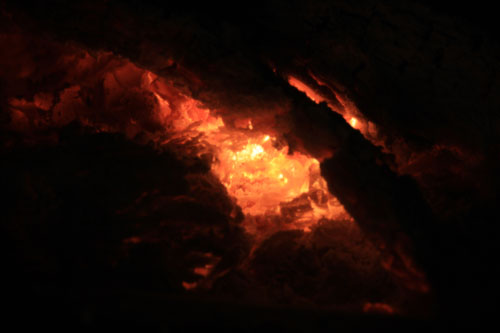
Glowing embers of rustic fireplace.
(*photo credit)
January 26, 2019 Fuller Commenting on Enlightened Self-Interest
Always consider the other person to be better than yourself, so that nobody thinks of his own interests first, but everybody thinks of other people's interests instead. (Philippians 2:4)
My Reflection for December 14, 2017 showed my disagreement over the concept of "enlightened self-interest" as conceived in today's world. Some challenged my view and noted that the concept was first used in 1835 by Alexis de Tocqueville in Democracy in America. What Tocqueville apparently mentioned is an enlightened regard for oneself as an agent to assist others within the community or civic association. I cannot fault such an understanding and regard that as part of the broad "public interest. Thus the sacrifice of time and property for the sake of the greater good, knowing full well that all including oneself will benefit from such a sacrifice, is a public -- not a selfish -- deed. Tocqueville was really contrasting the American and the French civic mentality of his day.
Rather, in a more modern understanding, the "self" is contrasted to the "public interest" and refers to the autonomous individual attempting to make his or her self a privileged individual apart from others. This is the total ego-oriented subject devoid of relationship or personhood with respect to others ("all for me, and me for me"). In fact such an egotist is separating the self from community and acts for his or her interests alone.
However, when one speaks of the "self" in a broader stroke of family, local community, region or nation, this goes far beyond the purview of an individual ego. I would not object to a social broader self, for actually the person so acting in a local society is conforming to the principle of subsidiarity, that is, acting at the lowest level of organization in which satisfactory results can be achieved. Enlightenment enters into communal activity -- but that is hardly an egotistic "self," except when using the term loosely to mean what is "properly" my home, my town, my country, or my world in which I am owed credit and gain personal profit.
We are enlightened through insight, and so this is an invitation seldom solicited. Regard the battle as between self-centered activity and the public interest. We can observe selfless saints, fallen heroes and sacrificing caregivers; their lives refute self-centeredness, even when in many cases it was a painful learning process. By giving up self, we gain all, including the elevation to a noble selfless state. With Jesus this takes a plunge of faith. While self-interest in contrast to public interest leads to greed, selfishness, social disruption, and loss of a sense of commons and democratic process, public interest leads to total fulfillment including that of our self worth.
Prayer: Lord, keep us public spirited; help us to sacrifice for the good of all, and thus ultimately gain a place with You.

A winter find at the market, fresh rose.
(*photo credit)
January 27, 2019 Initiating Eleven Types of Liberation
He has sent me to proclaim liberty to captives. (Luke 4:18)
Today, we hear the Word and we pronounce it as Jesus did when reciting the passage from Isaiah the prophet. We too are to bring liberation into the world in which we are expected to conform:
Peer pressure: Many are bound by what others require and think and say. Thus assisting others may require us to go counter to such strictures, for many want us to act in the precise way they want us to behave -- and that is never countercultural;
Demanding expectations: Some chart our lives for us and when we do not conform they exert pressure. We need to prepare them for what the Spirit moves us to do and say in an atmosphere of freedom;
Material wants: In being like Christ we desire to be liberated from excessive material goods and thus any greed can vanish;
False witnessing: We are often forced to say how nice certain things are and to smile when we really want to open up and tell the raw truth, no matter who is offended or how risky it is;
Living extravagantly: We need to free ourselves from the social pressure to dress like others, eat like others, and do the same things as others (lawns, types of vehicles, forms of entertainment), rather than to do it as directed by the Spirit;
Unhealthy practices: Stress, wrong foods, smoking, drugs, and other bad habits can be avoided through the liberation resulting from self-abnegation and radical sharing;
Busyness: By valuing silence, less travel, physical exercise, prayer and meditation we can make an abrupt change from the occupational conformity and stress that comes constantly;
Meaningless suffering and sacrifice: When we enter into Christ's life we discover value in the little or big crosses we must bear and find that this counters a pessimistic world;
Fantasy world: Too many live a life of make-believe, but few call attention to this for fear of being regarded as a kill-joy or prudish;
Feeling old or worthless: We ought to value the wisdom of the elder and that aging can become an opportunity to see that each thing we do in an ever-shortening time span has infinite value; and
Failure to engage in the environment: Each of us must see that we live in a troubled world, and that our actions affect all other creatures to some degree -- so always act in a green manner.
Prayer: Lord, You are liberator; make us liberated.

Turkey, Meleagris gallopavo, following a Kentucky state highway.
(*photo credit)
January 28, 2019 Observing Road Safety Practices
Road safety tips are healthy reminders to all of us whether drivers or bikers. All things considered, all of us on the road -- drivers, riders, bikers and walkers -- need to be careful for our own safety and that of others with whom we share the road. In most countries of the world such accidents are the number one cause of the 15-29 year age-group death rate. Statisticians tell us that 90% of these deaths occur in developing countries, meaning that safety has a long way to go when more and more motor vehicles are added to already crowded highways and byways. Furthermore, it is expected that the global road deaths especially in developing nations will hit two million by the year 2020.
Congestion is not the only cause of road accidents. People, especially younger drivers, show off their skills and take risks; some take alcohol and other drugs while attempting to drive; still others speed, fail to maintain their vehicles and disobey existing road rules; many non-drivers walk to and from work or market or school on unsafe roads. Furthermore, the local and regional governments are distracted by other problems and negligent with respect to road and motor vehicle maintenance and regulations. When the United Kingdom cracked down on driving practices the nation was able to cut road accidents in half.
What needs to be done? We travel too fast, too far without breaks, and we travel too close to the car in front of us. We become tired and impatient and drowsy. We all need to drive at the speed limit, observe signs, use proper signals, know when too old or infirm to drive, avoid eating while driving, or smoking or drinking, or using a cell phone, or texting messages, or writing letters, or becoming distracted. Yes, we need to take responsibility for the safety of the roads for many depend on us for their own safety. And we ought to have an added safety device -- something I would never have asked for a year ago being the last person on Earth with a cell phone; this device is needed in the car in case of emergency, even if not carried around all day.
Roads are a blessing: a movement away from the curse of isolation; a portal to the outside world; a gateway to distant places; a means to marketing products and obtaining necessities; a path to vacation and sightseeing; and a manner of getting to work or school safely and quickly. Roads are good, but the many little crosses sprouting along the side of them remind us that roadways are places of death and injury, and overturned vehicles, and flashing lights, and ambulance sirens, and ruined dreams. The smooth highway to greatness, can lead to an accident with its dire consequences. It only takes a second and a crashing sound -- and then all of life flashes before the mind. Let's be safe!
Prayer: Jesus, you are the way, the truth and the life. Move us to see and use the way clearly, to be truthful and honest with our limited abilities when on the way, and to value our own and the lives of others so highly that we will drive safely at all times.

Remnants of black snake skin, found in winter barn.
(*photo credit)
January 29, 2019 Redefining the Privilege of Offsetting
It's not that there are too many Chinese and Indians in the world; it's just that too many of them want to be like us.
Anonymous barstool pundit
Some folks prefer to continue in their luxurious ways. The privileged affluent Americans (the upper 1%) reside in a land of bigness (financial and militarily), are able to inherit power, and have access to those of influence. Often in the mistaken name of democracy they retain their privileges through absence of good regulations or fair taxes. In truth, the "they" are really "we" with our literacy, spare time, computer base, security, protective laws, and ability to freely communicate, which are privileges. If we are somewhat privileged, let's take the responsibility to share these resources with the global underprivileged.
Carbon offsetting is a guilt offering for the privilege of using some resource. It may involve buying potential forestlands and then proceeding to pay someone to plant saplings; these plantings will take a hundred years to offset the fuel used (and carbon footprint) for attending a conference of some sort. Passive attendees cannot always justify travel when the information gained could have been learned by clicking on Internet sources -- though socializing through face-to-face meetings has intangible benefits. However, the offset trees can be damaged, die, be eaten by goats or struck by opportunistic diseases that kill entire species or sub-species -- elms, pines, hemlocks, dogwood and American chestnuts. Furthermore, a future, highly down-sized culture may decide to cut the trees for firewood. There's no guarantee the offset will pay off, only the irresponsible hope that excess use of resource will be offset through someone else's responsible action.
Yes, we are privileged and let's be frank about it: part of our privileged duty is to help make the world better. We need to be Passover people, passing over privilege for the sake of the duty of looking at a world of critical needs. In accepting the privileged power to make change in meaningful ways, we ought to give up self interests for the greater whole. We must move from unsustainable ways to more sustainable means that provide good food, housing, health and education for an entire global population. Thus we can redefine offset as accepting the privilege to serve others in ways that allow all to share a better world.
The one who offsets in order to continue wasteful and unsustainable ways of living is expending precious time and resources that should be spent by an involved citizenry working to "enforce meaningful change" upon the system. How much longer will it take to heal the planet due to a false and greedy offsetting? We need to move quickly to effective solutions through sharing.
Prayer: Lord, don't stop us from planting trees, only from planting trees so others can waste our limited resources that ought to be used as part of essential services for needy folks.

Unidentified fungus. Laurel Co., KY.
(*photo credit)
January 30, 2019 Rereading "The Economic Bill of Rights"
Some 75 years ago during the height of World War II, President Franklin D. Roosevelt (birthday today) sought in his State of the Union message an expanded Bill of Rights. Here are excerpts:
This Republic had its beginning, and grew to its present strength, under the protection of certain inalienable political rights -- among them the right of free speech, free press, free worship, trial by jury, freedom from unreasonable searches and seizures. They were our rights to life and liberty. As our nation has grown in size and stature, however -- as our industrial economy has expanded -- these political rights proved inadequate to assure us equality in the pursuit of happiness.
We have come to a clear realization of the fact that true individual freedom cannot exist without economic security and independence. "Necessitous men are not free men." People who are hungry and out of a job are the stuff of which dictatorships are made. In our day these economic truths have become accepted as self-evident. We have accepted, so to speak, a second Bill of Rights under which a new basis of security and prosperity can be established for all -- regardless of station, race, or creed. Among these are:
* The right to a useful and remunerative job in the industries or shops or farms or mines of the nation;
* The right to earn enough to provide adequate food and clothing and recreation;
* The right of every farmer to raise and sell his products at a return which will give him and his family a decent living;
* The right of every businessman, large or small, to trade in an atmosphere of freedom from unfair competition and domination by monopolies at home or abroad;
* The right of every family to a decent home;
* The right to adequate medical care and the opportunity to achieve and enjoy good health;
* The right to adequate protection from the economic fears of old age, sickness, accident, and unemployment;
* The right to a good education.
All these rights spell security. And after this war is won we must move forward, in the implementation of these rights, to new goals of human happiness and well-being.
Prayer: Lord, give us the grace and energy needed to secure these rights, not only for our people, but for all peoples.

January freezing rain.
(*photo credit)
January 31, 2019 Affirming that Nothing is Ever Lost
Nothing in the universe is unknown, nothing real is ultimately forgotten. The atom that moves in an immeasurable path today and the atom that moved in an immeasurable path billions of years ago are rooted in the eternal ground. There is no absolute, no completely forgotten past, because the past like the future is rooted in the divine life. Nothing is completely pushed into the past. Nothing real is absolutely lost and forgotten.
(Paul Tillich, The Eternal Now, p. 35)
The past stands as meaningful. Intuitively, believers affirm a compassionate and loving God, our ground and future. We rest assured in that faithful atmosphere that nothing that existed is forgotten and thus nothing that was painful or a suffering event evaporates into thin air. The past does not sink into nothingness, for all the past becomes meaningful history and affects what and who we are. If we say this with assurance then our past has meaning, and each of us and our actions are important, even when we are unaware that we contributed to the entire process of the universe. For Christians, Christ came and redeemed all, giving suffering and all life a special meaning. All things are reconciled through him and for him (Colossians 1:20) and that includes the past events and movements that fit into the entire order of creation.
The future emerges with meaning. The future does not yet exist, but it gives the present moment a special goal and horizon to which, in hope, what has gone gives direction. We are more able now to see the direction towards which we are heading because history taught us to see and focus more clearly. We know the world is not a meaningless and fading place; rather we see that it contributed to a ray of hope of what is still to come. However, if we believe that nothing was lost, then we are fortified with the stamina needed to await a meaningful future. God beckons us on to the journey into the future and we help give it meaning through the divine invitation to take part in making it come to be. As serious learners from the past we give ourselves to help bring on the future that is yet to be. Because of our past we make a future that is in part the result of our free choice and actions.
The present moment has special meaning. Our free will offering to accompany the Lord is fashioned into the forgiven imperfections that specify our unique willingness to partake more fully in bringing all things to unity. We become conscious that the past has made us who we are and prepared us over time for the tasks we must undertake at this moment. Our current actions, when done in the fullness of that history of salvation, actually help hasten the day of the Lord's coming. Thus for us working in Christ, we find this day a special unity that makes us one in God's work.
Prayer: Lord, while we glory in the part you choose us to take in salvation history, help us to discover that the practical aspects of what we did and do are of utmost importance. |